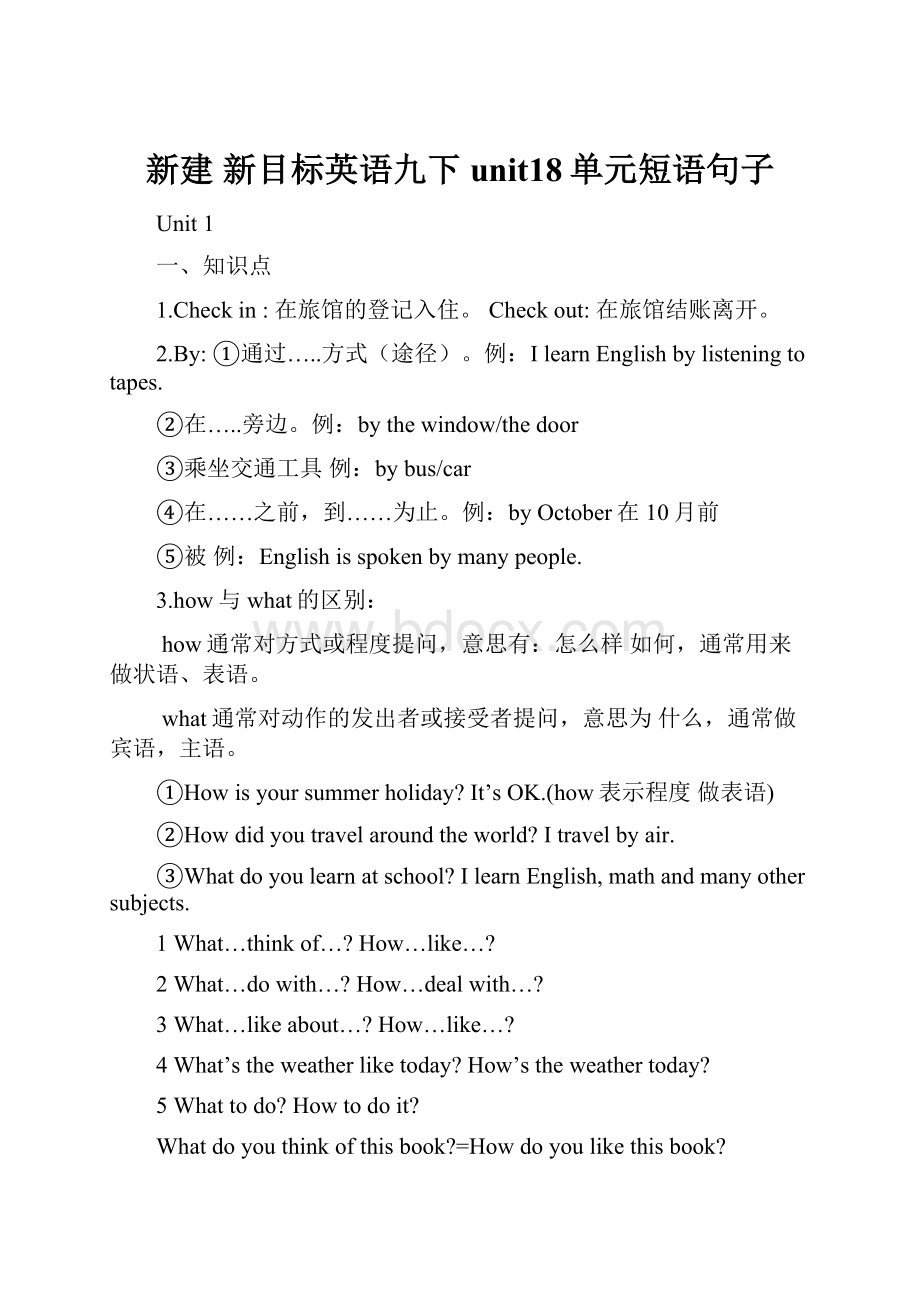新建 新目标英语九下unit18单元短语句子.docx
《新建 新目标英语九下unit18单元短语句子.docx》由会员分享,可在线阅读,更多相关《新建 新目标英语九下unit18单元短语句子.docx(51页珍藏版)》请在冰豆网上搜索。

新建新目标英语九下unit18单元短语句子
Unit1
一、知识点
1.Checkin:
在旅馆的登记入住。
Checkout:
在旅馆结账离开。
2.By:
①通过…..方式(途径)。
例:
IlearnEnglishbylisteningtotapes.
②在…..旁边。
例:
bythewindow/thedoor
③乘坐交通工具例:
bybus/car
④在……之前,到……为止。
例:
byOctober在10月前
⑤被例:
Englishisspokenbymanypeople.
3.how与what的区别:
how通常对方式或程度提问,意思有:
怎么样如何,通常用来做状语、表语。
what通常对动作的发出者或接受者提问,意思为什么,通常做宾语,主语。
①Howisyoursummerholiday?
It’sOK.(how表示程度做表语)
②Howdidyoutravelaroundtheworld?
Itravelbyair.
③Whatdoyoulearnatschool?
IlearnEnglish,mathandmanyothersubjects.
1What…thinkof…?
How…like…?
2What…dowith…?
How…dealwith…?
3What…likeabout…?
How…like…?
4What’stheweatherliketoday?
How’stheweathertoday?
5Whattodo?
Howtodoit?
Whatdoyouthinkofthisbook?
=Howdoyoulikethisbook?
Idon’tknowwhatIshoulddowiththematter.=Idon’tknowhowIshoulddealwithit.
WhatdoyoulikeaboutChina?
=HowdoyoulikeChina?
Idon’tknowwhattodonextstep?
=Idon’tknowhowtodoitnextstep?
㊣Whatgood/badweatheritistoday!
(weather为不可数名词,其前不能加a)
㊣Whatafine/baddayitistoday!
(day为可数名词,其前要加a)
4.aloud,loud与loudly的用法:
三个词都与"大声"或"响亮"有关。
①aloud是副词,重点在出声能让人听见,但声音不一定很大,
常用在读书或说话上。
通常放在动词之后。
aloud没有比较级形式。
如:
Hereadthestoryaloudtohisson.他朗读那篇故事给他儿子听。
②loud可作形容词或副词。
用作副词时,常与speak,talk,laugh等动词连用,多用于比较级,须放在动词之后。
Shetoldustospeakalittlelouder.她让我们说大声一点。
③loudly是副词,与loud同义,有时两者可替换使用,但往往
含有令人讨厌或打扰别人的意思,可位于动词之前或之后。
Hedoesnottalkloudlyorlaughloudlyinpublic.他不当众大声谈笑。
5.voice指人的嗓音也指鸟鸣。
Inaloud/lowvoice/keepdownyourvoice
sound指人可以听到的各种声音。
Soundlikeagoodidea/funsounds-+adj
noise指噪音、吵闹声makeanoisenoisy
6.find+宾语+宾补(名词形容词介词短语分词等)
Ifindhimfriendly.Wefoundherhonest.
Ifoundhimworkinginthegarden.Hefoundthewindowclosed.Wefoundhiminbed.
7.常见的系动词有:
①是:
am、is、are②保持:
keep、stay
③转变:
become、get、turn④feel、look、smell、taste、sound
9.动词不定式做定语
①与所修饰的名词构成主谓关系
ThenexttraintoarrivewasfromNewYork.Heisalwaysthefirsttocome.
②与所修饰的名词构成动宾关系
Ihavenothingtosay.Ineedapentowritewith.
Ineedsomepapertowriteon.Idon’thavearoomtolivein.
10.practice,fun做名词为不可数名词
.havefundoingsth玩得高兴
practisespeakingEnglish练习说英语
12.join加入某团体并成为其中一员attend出席参加会议或讲座
joinin与takepartin指参加到某项活动中去。
13.all、both、always以及every复合词与not连用构成部分否定。
其完全否定为:
all---none,both---neither,everything---nothing,everybody---nobody.
14.beafraidofdoingsth./sth.害怕beafraidofbeingalonebeafraidtodosth.害怕
beafraidthat恐怕担心,表示委婉语气
15.either:
①放在否定句末表示“也”
②两者中的“任一”
③either…or…或者…或者.…引导主语部分,谓语动词按照就近原则
plete完成,是个较正式的词,后不能接动名词
finish指日常事物的完成
17.a,an与序数词连用表示“又一”,“再一”。
例:
Pleasegivemeasecondapple.Therecomesafifthgirl.
18.havetrouble/difficult/problem(in)doing…..干…..遇到麻烦,困难
19.unless除非,如果不,等于“ifnot”表示否定,引导条件状语从句,主句为将来时,条件状语从句用一般现在时表示将来。
Mybabysisterdoesn’tcryunlessshe’shungry.
Mybabysisterdoesn’tcryifsheisn’thungry.
Unlessyoutakemorecare,you’llhaveanaccident.
如果你不多加小心的话,你会出事的。
20.instead:
adv.代替,更换。
Wehavenocoffee,wouldyouliketeainstead?
我们没有咖啡了,改喝茶好吗?
Itwilltakedaysbycar,solet’sflyinstead.
开车去要好几天呢,咱们还是坐飞机吧。
Tomwasill,soIwentinstead.汤姆病了,所以换了我去。
insteadofdoingsth.作为某人或某事物的替换
例:
Let’splaycardsinsteadofwatchingTV.
Wesometimeseatriceinsteadofpotatoes.
Givemetheredoneinsteadofthegreenone.
21.spoken口头的,口语的。
spokenEnglish/oralEnglish英语口语
speaking讲话的,说某种语言的。
Speakingskills讲英语的能力.improvemyspeakingskills提高我会话技巧
anEnglish—Speakingcountry
22.提建议的句子:
①What/howabout+doingsth.?
如:
What/Howaboutgoingshopping?
②Whydon’tyou+dosth.?
如:
Whydon’tyougoshopping?
③Whynot+dosth.?
如:
Whynotgoshopping?
④Let’s+dosth.如:
Let’sgoshopping
⑤Shallwe/I+dosth.?
如:
Shallwe/Igoshopping?
23.alot许多常用于句末如:
Ieatalot.我吃了许多。
24.too…to太…而不能常用的句型too+adj./adv.+todosth.
如:
I’mtootiredtosayanything.我太累了,什么都不想说。
25.not…atall一点也不根本不如:
Ilikemilkverymuch.Idon’tlikecoffeeatall.
我非常喜欢牛奶。
我一点也不喜欢咖啡。
not经常可以和助动词结合在一起,atall则放在句尾
26.be/getexcitedaboutsth.===be/getexcitedaboutdoingsth.
===beexcitedtodosth.对…感兴奋如:
Iam/getexcitedaboutgoingtoBeijing.===
IamexcitedtogotoBeijing.我对去北京感到兴奋。
27.①endupdoingsth终止做某事,结束做某事如:
Thepartyendedupsinging.晚会以唱歌而结束。
endupspeakinginChinese以说汉语结束对话
②endupwithsth.以…结束如:
Thepartyendedupwithhersinging.晚会以她的歌唱而告终。
28.firstofall首先tobeginwith一开始lateron后来、随
29.also也、而且(用于肯定句)常在句子的中间
either也(用于否定句)常在句末
too也(用于肯定句)常在句末=aswell
Iamalsoastudent.我也是一个学生
Iamastudenttoo.我也是一个学生。
Iamnotastudenteither.我也不是一个学生。
30.makemistakes犯错
mistakesb.for…把……错认为……
makemistakes(in)doingsth.在干某事方面出错
bymistake错误地;由于搞错
mistake---mistook----mistaken
如:
Ioftenmakemistakes.我经常犯错。
Imistookhimforhisbrother.我错把他认成了他的哥哥。
makeamistake犯一个错误如:
Ihavemadeamistake.
我已经犯了一个错误。
31.laughatsb.笑话;取笑(某人)
如:
Don’tlaughatme!
不要取笑我!
32.takenotes做笔记,做记录keepanEnglishnotebook记英语笔记
33.enjoydoingsth.喜欢做…乐意做…如:
Sheenjoysplayingfootball.她喜欢踢足球。
enjoyoneself过得愉快如:
Heenjoyedhimself.他过得愉快。
34.nativespeaker说本族语的人
35.oneof+(the+形容词比较级)+名词复数形式…其中之一
如:
Sheisoneofthemostpopularteachers.她是最受欢迎的教师之一。
36.It’s+形容词+(forsb.)todosth.(对于某人来说)做某事…
如:
It’sdifficult(forme)tostudyEnglish.对于我来说学习英语太难了。
句中的it是形式主语,真正的主语是tostudyEnglish
37.practicedoing练习做某事如:
SheoftenpracticespeakingEnglish.她经常练习说英语。
38.decidetodosth.决定做某事
LiLeihasdecidedtogotoBeiJing.李雷已经决定去北京。
39.dealwith处理如:
Idealtwithalotofproblems.
41.beangrywithsb.、stayangry生气
Bemadwithsb/be/getannoyedwithsb对某人生气Iwasangrywithher.我对她生气。
42.perhaps===maybe也许
43.goby(时间)过去passby如:
Twoyearswentby.两年过去了。
44.seesb./sth.doing看见某人正在做某事强调正在发生seesb./sth.do看见某人在做某事如:
如:
Shesawhimdrawingapictureintheclassroom.她看见他正在教室里画画。
46.regard…as…把…看作为….如:
TheboysregardedAnnaasafool.这些男孩把安娜看成傻瓜。
47.toomany 许多 修饰可数名词 如:
toomanygirls
toomuch 许多 修饰不可数名词如:
toomuchmilk
muchtoo 太 修饰形容词如:
muchtoobeautiful
48.change… into… 将…变为…
如:
Themagicianchangedthepenintoabook.这个魔术师将这本书变为一本书。
49.withthehelpofsb.==withone’shelp在某人的帮助下
如:
withthehelpofLiLei==withLiLei’shelp在李雷的帮助下
50.compare…to… 把…比作 compare…(with)…把…和…作比较
Compareyoutothesuninthemorning.
CompareyouwithAnna,youarelucky.你和安娜相比,你是幸运的。
1.bymakingflashcards通过做单词抽认卡
2thatway(=inthatway)通过那种方式
3forexample(=forinstance)例如
4.doasurveyabout…做有关…的调查
5.getthepronunciationright使发音准确
6.lookup(v+adv)查找,查询
7.makeup编造,虚构,化妆,打扮
8worryaboutsb./sth.担心某人/某事 worry是动词
beworriedaboutsb./sth.担心某人/某事 worried是形容词
如:
Don’tworryabouthim.不用担心他。
Motherisworriedaboutherson.妈妈担心他的儿子。
9.physicalproblems身体上的问题10.breakoff中断,突然终止
三、句子
1.Howdoyoustudyforatest?
你怎样为考试做准备?
2.Ihavelearnedalotthatway.用那种方法,我已经学到了很多东西。
3.It’stoohardtounderstandthevoice.听懂那些声音太难了。
4.Memorizingthewordsofpopsongsalsohelpedalittle.
记流行歌曲的词也起作用。
5.WeiMingfeelsdifferently.卫明有不同的感受。
6.Hefindswatchingmoviesfrustrating.他觉得看电影让人感到沮丧.
7.Sheaddedthathavingconversationswithfriendswasnothelpfulatall.
她又说和朋友对话根本没用。
8.Idon’thaveapartnertopracticeEnglishwith.我没有搭档一起练习英语。
9.Lateron,Irealizedthatitdoesn’tmatterifyoudon’tunderstandeveryword.随后,我认识到听不懂每个词并没有关系。
10.It’samazinghowmuchthishelped.我惊异于这些方法竟如此有用。
11.Myteacherisveryimpressed.给老师留下了深刻的印象。
12.Shehadtroublemakingcompletesentences.她很难造出完整的句子。
14.MostpeoplespeakEnglishasasecondlanguage.英语对于大多数人来说是第二语言。
15.Howdowedealwithourproblem?
我们怎样处理我们的问题?
16.Itisourdutytotryourbesttodealwitheachchallengeinoureducationwiththehelpofourteachers.在老师的帮助下尽我们最大的努力来应对挑战是我们的责任。
Hecan’twalkorevenspeak.他无法走路,甚至无法说话
Unit2
一、知识点
1.usedto+dosthusedto+be
过去常常做某事,现在已经不存在的动作或状态.
Thereusedtobe….(反意疑问句)didn’tthere?
否定形式为:
didn’tuseto或usedn’tto
疑问形式为:
Did…useto…?
或Used…to…?
be/getusedtodoingsth.习惯于,to为介词.
2.wear表示状态.=bein+颜色的词puton表示动作.
dress+人给某人穿衣服.dresssb./oneself
3.ontheswimteamon是…的成员,在…供职.
4.Don’tyourememberme?
否定疑问句.(考点)
Yes,Ido.不,我记得.No,Idon’t是的,我不记得了.
5.反意疑问句:
①陈述部分主语为this,that,疑问部分主语用it;陈述部分主语用these,those,疑问部分用they做主语.
例:
Thisisanewstory,isn’tit?
Thoseareyourparents,aren’tthey?
②陈述部分是therebe结构,疑问部分仍用there
TherewasamannamedPaul,wasn’tthere?
③Iam后的疑问句,用aren’tIIaminClass2,aren’tI?
④陈述部分与含有not,no,never,few,little,hardly,seldom,neither,none等词时,疑问部分用肯定.
Fewpeoplelikedthismovie,didn’tthey?
但陈述句中若带有否定前缀或后缀的单词时,这个句子仍视为肯定,后面仍用否定.
例:
Yoursisterisunhappy,isn’tshe?
⑤陈述部分的主语若为不定式或V-ing短语,疑问部分主语用it.
例:
Tospendsomuchmoneyonclothesisunnecessary,isn’tit?
6陈述句中主语是nobody,noone,everyone,everybody等指人的不定代词时
疑问部分用they做主语;若陈述部分主语是something,anything,noting,everything等指事物的不定代词时,疑问部分用it做主语.
Nobodysaysonewordabouttheaccident,dothey?
Everythingseemsperfect,doesn’tit?
⑦当主语是第一人称I时,若谓动为think,believe,guess等词时,且其后跟宾丛,这时疑问句部分的人称,时态要与宾语从句保持一致,同时还要考虑否定转移.
例:
Idon’tthinkhecanfinishtheworkintime,canhe?
⑧前面是祈使句,后用willyou?
(let’s开头时,后用shallwe?
)
6.beterrifiedof害怕的程度比beafraidof深如:
Iamterrifiedofthedog.
beterrifiedofdoingsth.如:
Iamterrifiedofspeaking.
7.miss:
①思念,想念Ireallymisstheolddays.
②错过,未中,未赶上,未找到.
It’sapitythatyoumissthebus.Theboyshotatthegoal,butmissed.
8.nomore(用在句中)=not…anymore(用在句尾)指次数;
nolonger(用在句中)=not…any